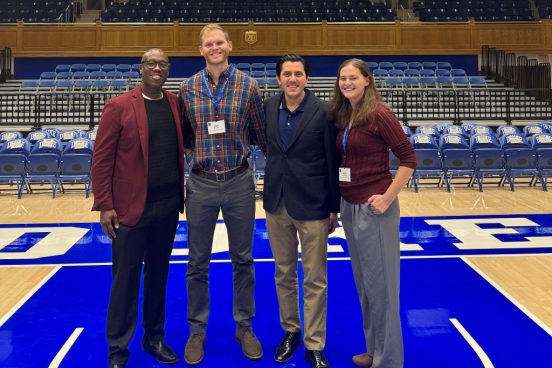Duke Weekend Executive MBA Student Blog

Taking Home the Top Prize at UCLA’s Inaugural Credit Competition

Getting Started
Our road to success started this past January, when Craig was reading the weekly newsletter from Fuqua’s Asset Management Club and saw an announcement for a high-yield credit competition hosted by UCLA’s Anderson School of Management and the Fink Center for Finance and Investment.
The competition attracted teams from top schools across the country, including Columbia, Northwestern, MIT and UC Berkeley, Michigan, Carnegie Mellon, NYU and UCLA. The first of its two phases consisted of building and managing a U.S. High Yield Corporate Bond portfolio using $100,000 of ‘paper money,’ with the goal of maximizing the portfolio’s total return over a 12-week period. During the second phase, teams would travel to Los Angeles at the conclusion of the portfolio competition to pitch a specific bond trade to a panel of distinguished investment management professionals, including representatives from DoubleLine Capital, TCW, Ares Management, and Hotchkis & Wiley.
Upon seeing the announcement, Craig immediately knew he wanted to compete and set out to recruit classmates. Brian, a CPA and experienced personal investor, joined him as did Nick, a credit research analyst, and Shinik, a commercial banker.
“I knew we needed students who were familiar with the markets, could analyze corporate risk, and still tie in broader economic and political variables into investment decisions. Having met so many people in the Weekend Executive MBA cohort, I was able to assemble a team quickly and hit the ground running.” – Craig
The early stages of the competition were not without challenges. A rush to meet the registration deadline was quickly followed by an extensive planning session on how our team, consisting entirely of working professionals, would balance the additional workload of the competition with all the other school, work, family, and personal demands of being an executive MBA student. Embracing these challenges, we devised a strategy and assigned roles and responsibilities to each team member. The first task was to create an investment thesis that would establish the guiding principles for how the fund would invest and trade around its positions. This thesis (linked at the bottom of this post) articulated our team’s broad macroeconomic view, sectors we believed could outperform in the 12-week period, and how we would make allocation and trade decisions.
Amidst the backdrop of a political roller coaster ride, volatility in the oil markets, pending health care legislation, and retail bloodshed, our team experienced its fair share of portfolio wins and losses across several sectors.
“Given the short 3-month window for investing, we knew we needed to make some bold decisions. But there was always that constant battle between conventional portfolio theories you learn in school versus concentrated risk.” – Brian
Competition Results and Key Takeaways
At the conclusion of the portfolio management phase of the competition, our team portfolio posted a cumulative total return over the 12-week period of 4.2 percent, giving us the first place prize of $3,000. Our team beat the benchmark index (Barclays High Yield Total Return Index) by 2 percent and edged out the runner up team by 0.82 percent. We then traveled to Los Angeles for phase two—the trade pitch.

“Squeezing in a 36 hour trip to L.A. two days before our first residency of Term 4 was a bit stressful but having built such great relationships within our team made for a fun trip. It was a rare opportunity to meet students from other full-time and Executive MBA programs and we walked away really impressed with the quality of the other competing teams as well as the panel of judges.” – Shinik
For the trade pitch, we took a somewhat unconventional route and argued for a ‘short’ position in the bonds issued by Frontier Communications Corp., a rural telecom provider. In doing so, we leveraged Nick’s experiences working as a buy-side telecom and cable analyst at Bank of America Merrill Lynch. Although we did not win phase two, we received a lot of positive feedback afterward from the judges and other participants, leaving us feeling pleased overall with the effort.
“Instead of starting from scratch on something completely new, I thought we could draw on a lot of the work I have already done on this company over the years to put together a compelling argument for the trade pitch. At the same time, this gave me an opportunity to share with my team the ins and outs of fundamental credit analysis, which is critical to trade selection.” – Nick
Participating in this competition was a great experience for the entire team. All team members walked away with a deeper understanding of financial markets and the investment management profession. If we can emphasize one final takeaway, it would be that despite the ongoing demands of an intensive Executive MBA program, you can still find time to participate in these kinds of extracurricular programs, be successful, and have fun!
“The camaraderie we developed as students allowed us to capitalize on our varied backgrounds and experiences and come together as a team to succeed in competition. Balancing the competition with all of our other priorities wasn’t easy, but when things got tough we rallied around each other and never lost sight of our goal. This is what the Team Fuqua spirit is all about.” – Craig
Read the team’s investment thesis here and more details about the competition here.


